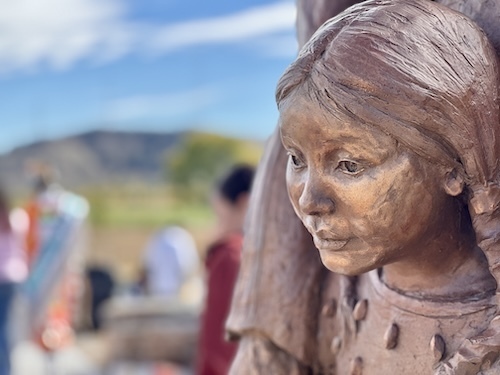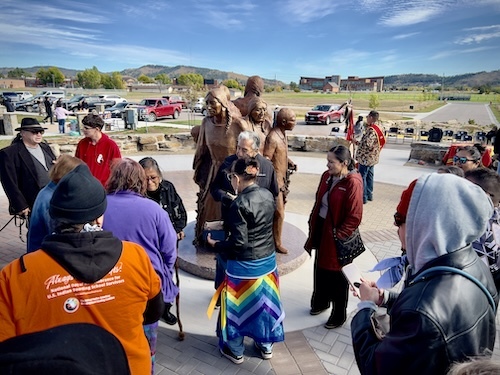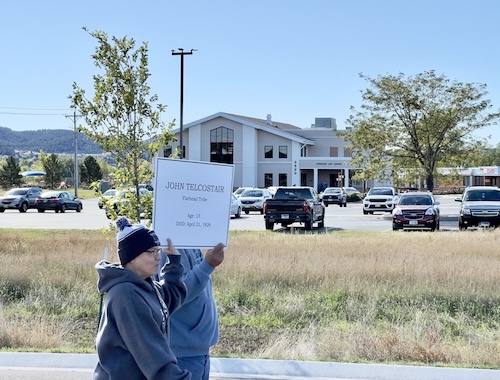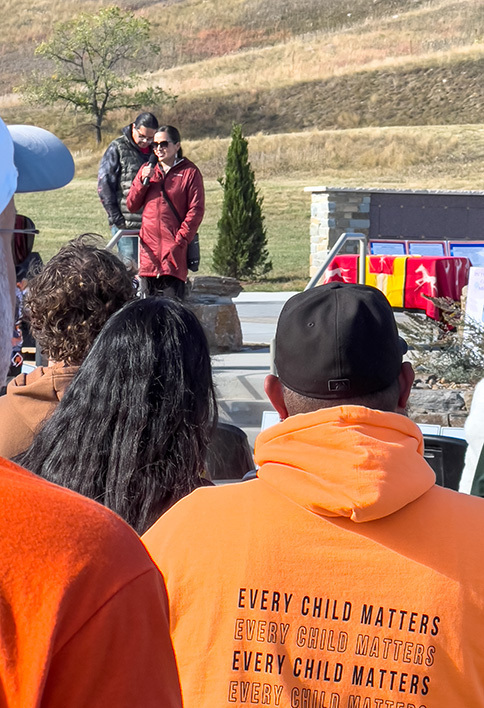
Remembering as a step towards healing
"We cannot honor what we refuse to remember," shared Bishop Lanette Plambeck. "Truth-telling is the first act of love in the story of our shared history."

Native girl from 'Tiwahe' sculpture at Remembering the Children Memorial. (photos by Dave Stucke)
Each October, residents in North and South Dakota – along with several other states – set aside days to honor and acknowledge the rich history, resilience, and contributions of Indigenous persons in our states. In 1990, South Dakota became the first state to designate Native American Day – the second Monday in October – as an official holiday. Since 2003, North Dakotans have recognized First Nations Day. (Legislation has been put forth to change the name to Indigenous Peoples' Day.)
As people of faith, United Methodists in the Dakotas and across the connection understand these observances as an invitation to move beyond celebration into meaningful reflection and action—acknowledging both the dignity of our Indigenous siblings and also remembering the pain of past injustices. They are an invitation to take on a humble posture that is willing to wrestle with hard truths about our past and commit to the complex and ongoing work of healing.
"Until I began my work with the Native American Comprehensive Plan, it didn't occur to me that even our mission statement needs a truth-telling with history," shared Bishop Lanette as she reflected on her own journey of understanding. "For Native children and adults, the 'making of disciples' stripped the imago Dei from them in a quest to remove their identity, language, spirituality, culture."

People gathered around the Tiwahe sculpture in Rapid City.
One of the places this truth-telling is happening in the Dakotas is in Rapid City, South Dakota. Over 200 people gathered today to walk from Sioux Park to the "Remembering the Children Memorial" adjacent to Rapid City Canyon Lake UMC. The memorial was mostly completed in 2024, thanks to generous donations, a hard-working board, input from many elders, and an easement from Canyon Lake UMC.
The centerpiece of the memorial is Tiwahe, a statue created by Dale Lamphere and a Lakota artist's apprentice, with input from nearly 100 people, was installed this past summer. It depicts a multi-generational Native American family being pulled apart by federal agents who took children from their families and sent them to Indian Boarding Schools across the U.S. and Canada. One of those schools was the Rapid City Indian Boarding School, which also sat on land now adjacent to the Canyon Lake church.
After the walk, several people spoke to the crowd, which included many elders, parents, youth, and children. Amy Sazue, Executive Director, emphasized the power of "Remembering" and of saying the names of the children who lost their lives in these Boarding Schools. She implored people never to forget the injustice wrought on Native people and culture by the United States government, attempting to eradicate Indigenous cultures, languages, and identities.
Several United Methodist clergy, and even more congregation members, were also on hand at the memorial walk. Pastor Scott McKirdy, serving Canyon Lake UMC, had taken part in previous memorial walks to this site. He said, "What was special to me was knowing that this year, we were not marching to a memorial that lay in the future, but a memorial that now exists, and just knowing how huge that is."
Naomi Hatfield, a member of Canyon Lake UMC, has taken part in the walk several times. Today, she felt the pain of the children as she took in the memorial, the people, the elders, and the words being shared.

Two walkers hold a placard honoring one of the children who died at the Rapid City Indian Boarding School.
She tried to put into words what she was feeling. "So many emotions. We take pride in having a beautiful native community that is initiating healing and reconciliation. I mean, they're so strong, it's such a beautiful culture, and they've just gone through such hardships, mostly because of what the immigrating government did, and the choices that government made, and people went along with it. And it was just such a horrendous wrong," shared Hatfield.
Sue Bass, who's been a part of Piedmont Grace UMC for many years, carried a memorial placard for Isadore Eagle Feather, Sioux.
She walked today, "to remember the children and everything that happened to them and their people. It's just hard to imagine what they went through. So, I want to try and help them in spirit, to let them know we care."
"Like some of the speakers said today, 'We have to keep remembering so we don't repeat things," said Hatfield. "Yet we seem to be heading down that road around our globe. We seem to be heading down that same wrong road over and over again."

Amy Sazue, Sicangu/Oglala Lakota, speaks to the crowd in Rapid City.
As those who seek to follow Jesus in the Wesleyan way of discipleship, confession and repentance are integral parts of personal and social holiness – the work that the Holy Spirit does in our hearts, character, and actions, as well as the healing work in relationships, systems, and structures. This includes our relationships as individuals – and as the church – with our Indigenous relatives.
"If the Church is going to begin the sacred work of repair, we must face our complicity in the harm done to Indigenous people," said Bishop Lanette.
Humble, honest confession is just the first step.
"Healing also requires partnership," she added. "We help by showing up with humility, listening more than we speak, and following the lead of Indigenous voices. We have the opportunity to step into places of pain and offer tangible means of repair and help."
United Methodist Discipleship Ministries offers resources as well as three action steps to take to honor Indigenous peoples and foster deeper relationships:
1. Learn the history of the land your church occupies and acknowledge it regularly.
Take time to research which Indigenous peoples originally stewarded the land where your congregation is located. Many resources are available online, such as Native Land Digital, to help you discover the Indigenous history in your area. Acknowledge this history during your worship services, church communications, and educational events. This simple practice of acknowledgment creates space for awareness and respect. This first step is just the beginning. To go further, research the land back movements occurring across the country and even through the United Methodist Church.
2. Support Native artists and storytellers; host a community event; amplify Native-owned businesses.
3. Support Indigenous-led initiatives and partner with Native organizations.
There are many Indigenous-led initiatives focused on uplifting people and working for justice, equity, and access to the things of life. Look for ways your congregation can support these efforts—whether through financial contributions, volunteering, or building partnerships based on mutual respect. By standing in solidarity with Native communities, we live out our call to seek justice and offer support. To go a step further, research "Missing Murdered Indigenous Women and Children" and the work that is being done to raise awareness of the disproportional rate at which this violence occurs.
This month is an invitation to learn, listen, and seek ways to honor the gifts of Indigenous peoples. When we do, we are not just celebrating history but building the foundation for just and flourishing communities in the spirit of Christ's love. These steps are simple yet significant ways to begin walking in humility and building relationships with Indigenous peoples. As we move forward, may we embrace our role as learners, allies, and supporters, fostering relationships that bring about healing and transformation for the world.
Resources to dig deeper:
- Book: An Indigenous Peoples' History of the United States by Roxanne Dunbar-Ortiz. This powerful book provides a comprehensive look at U.S. history from the perspective of Indigenous peoples, challenging traditional narratives and highlighting the resilience and contributions of Native communities. It's an essential read for anyone wanting to understand the long-standing impact of colonization and the strength of Native resistance and survival.
- Podcast: All My Relations. This podcast, hosted by Matika Wilbur (Swinomish and Tulalip) and Adrienne Keene (Cherokee Nation), explores relationships between Native peoples, their communities, and the world. Each episode dives into conversations around identity, culture, history, and present-day issues faced by Native peoples, providing insight into how Indigenous peoples navigate life today while honoring their traditions.
- Documentary: Rumble: The Indians Who Rocked the World. This documentary shines a light on the often-overlooked influence of Native Americans in popular music, from rock and blues to jazz and folk. It's an eye-opening film that showcases the contributions of Indigenous musicians and how they have shaped modern music, while also addressing cultural appropriation and historical erasure.
- Discussion Guide for the movie Killers of the Flower Moon. This study guide from the ELCA (Evangelical Lutheran Church in America) Truth and Healing Movement helps people think more deeply and critically about the film, the real history, and how the effects carry forward to this day. It is important to remember that this history doesn't define the totality of the Osage Nation; it is part of a larger, expansive history in which the nation continues to persevere as a sovereign nation.
Ragghi Rain, chairperson of the Native American International Caucus of The United Methodist Church, issued a statement on behalf of United Women in Faith. "As we recognize Indigenous Peoples' Day, we are called to deepen our commitment to justice, respect, and remembrance — not only in words, but through meaningful action. At our most basic level, we are called to love our neighbors as ourselves. Hateful comments towards Indigenous communities reflect a heart that is neither yielded to Christ nor in pursuit of values of hope, faith, and love. In addition to raising our voices, we pray for the healing and well-being of our Indigenous brothers and sisters, healing of the land, and healing of our country. In a moment when hate speech and discrimination continue to surface, we commit to amplifying the voices of Indigenous communities, pursuing justice, and embodying Christ's call to love our neighbors fully."
The work of repentance, reconciliation, and relationship-building is a long journey – but it is one that is fueled by hope.
"Our hope is tied to holy imagination for what can be when truth, justice, and mercy walk together - as we honor and build authentic relationships," said Bishop Lanette.
Hatfield, too, shared that sense of hope even amidst the reality of deep wounds and painful history. "There's a lot of sadness, but there's a lot of hope," added Hatfield. "I do think they are proof that good will always win because God is among us. God is good, all the time. All the time, God is good. And God cannot be defeated. Goodness cannot be defeated."
Additional United Methodist Resources
UMC General Board of Church and Society – Indigenous Peoples
Faith & Facts Card: Indigenous Peoples (PDF)
The Book of Resolutions, ¶3301: “The Church and Native American People”
Resources to Celebrate Native American Heritage Month (November)
Worship resources to celebrate NAHM
The National Native American Boarding School Healing Coalition
Understanding Methodist’s role in and response to the Sand Creek Massacre